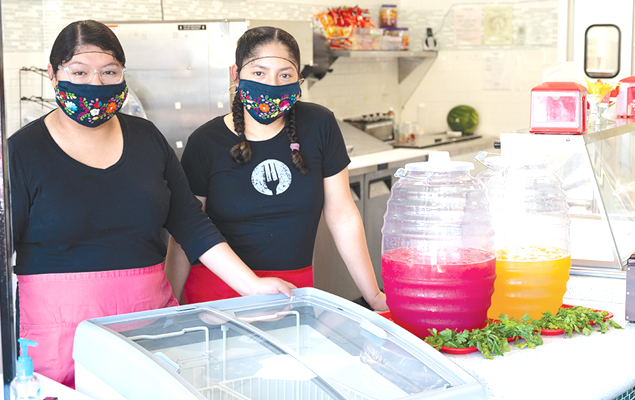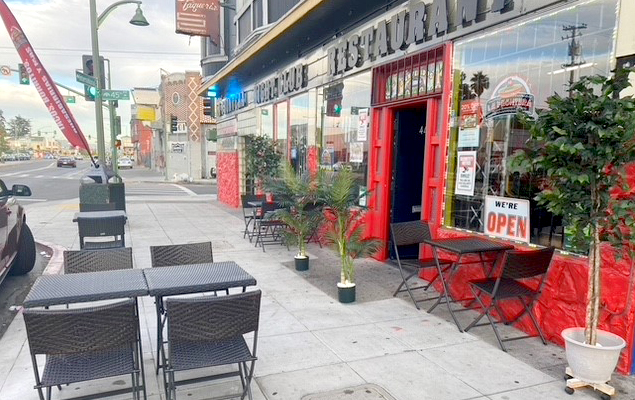
Berenice Serrano of Oakland started her first business this past February. The 25 year-old married mother of two children operates Unique Artisan Ice cream in Hayward.
Originally from Puebla, Mexico, Serrano arrived to the U.S. when she was four years old. Before making the financial commitment to open her store, Serrano was making ice-cream for family, neighbors, and for parties and events. She was also selling her ice cream at farmers markets. The business was doing well and she decided to expand with a rented place in Hayward, close to Cal State University. She expected that the university students and professors would come to her shop to enjoy the ice cream, fruit and coffee.
In December 2019, Serrano signed a five-year lease and started operations on February 22nd.
“I was confident about the business, but I knew it was going to be hard at the beginning because it was a new business,” she says.
When the shelter in place order began in March, things changed drastically for Serrano.
“I was barely selling anything, we had to close,” says Serrano. “Everything was closed, people were afraid to go out.”
After a while, she was able to open for limited hours, but was barely selling anything due to the shelter in place order.
“I was opening for five hours from 3:00 p.m. to 8:00 p.m., but nobody was coming or calling to get an ice cream. All my money was invested here and the bills for the business were coming in.”
When shelter in place began, my husband couldn’t work, so we were stuck. I had to ask my parents for financial help.”
Serrano applied for a business loan through SBA but was rejected because of her DACA status.
Prior to the COVID-19 pandemic, Hispanic small business owners were the fastest growing group of entrepreneurs in the U.S. Over the past decade, the number of Hispanic business owners grew 34 percent, compared to one percent for all business owners in the country.
Prior to the COVID-19 pandemic, there had never been more Hispanics in the workforce, according to Labor Department reports. The jobless rate for Hispanics hit a record low of 3.9%.
Located on International Blvd. in Oakland, La Frontera Mexican Restaurant is another new business that launched just before the COVID lockdown.

La Frontera's specialty is the quesabirria, a taco stuffed with beef birria and melted cheese inside a crisp orange shell.
Owner Valentino Carrillo opened the restaurant on February 2nd.
“We were busy from the beginning,” says Carillo, who is an experienced business person.
He closed the restaurant for a week in March, but has seen healthy growth since then.
“We’ve grown through the COVID situation,” states Carillo, noting that he’s gone from four employees then to fourteen now.
Talking with other Hispanic and local business owners, Carillo says that a lot of them are struggling with the technology required to compete in the current situation.
In addition to being very active on social media for his restaurant and nightclub, Carillo had an app and online ordering platform developed instead of relying on delivery services such as Doordash.
“It’s been very good for us because we don’t have to pay all those fees,” he says.
La Frontera was also one of the first restaurants in Oakland to apply for the city’s Flex Streets program, which aims to support economic recovery by making it easier for retailers, restaurants and other allowed businesses to use larger portions of the sidewalk, parking lanes and streets.
Carillo has begun construction of a parklet dining patio in front of his restaurant.
Contrasting to what he sees from other business owners in Oakland, Carillo says, “I’m totally calm and things are going smooth. And we’re continuing to grow.”
Back in Hayward, Serrano says that her ice cream shop is still open today and is doing better.
“The community has really helped me through the hardest times,” she says. “I hope it keeps getting better. It is great that now at least I can pay my bills and the lease.”
The young business owner has made many changes to her business in response to the COVID situation and to customer preferences.
“I changed my flavors of ice cream to what the local community wanted,” she says. “And we tried Uber Eats and other delivery partners. I believe if I can make it through this year, it will be a really good business.”
Regarding future lockdown measures, Serrano says, “It’s so unpredictable, things happen so randomly. It’s kind of overwhelming.”
